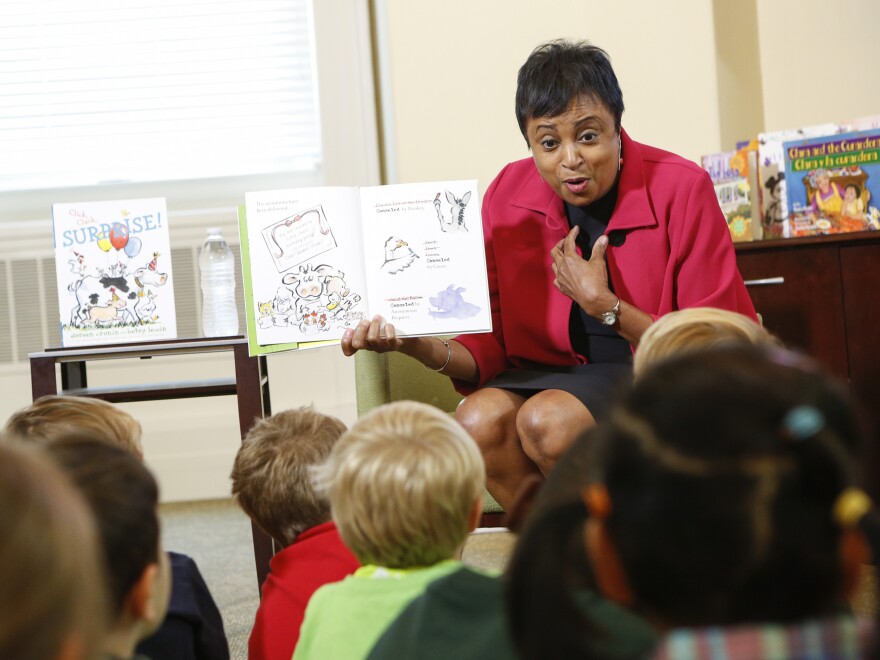More than half of Duval County's third graders can't read at grade level, and the percentage has decreased over the past four years.
Children from impoverished, minority communities lag the most, even though parents across all demographic categories recognize the importance of early literacy, according to new research from the Jacksonville Public Education Fund.
Reversing the trend will take a communitywide effort that eliminates barriers that hinder parental involvement, JPEF says.
The fund, along with the Kids Hope Alliance, is leading a broad-based campaign to bring about systemic change. Also involved are Duval County Public Schools, the Jacksonville Public Library, the Early Learning Coalition of Duval County, WJCT Public Media, literacy organizations, health and cultural organizations, the philanthropic community, businesses, teachers and local authors.
The initiative, READ JAX, includes a summer reading challenge to highlight the importance of reading at least 20 minutes a day. It encourages adults to read to or with children to help them become more proficient and establish habits to succeed in life.
Research released by JPEF this week shows that about 90% of Duval County parents know reading is important and 71% believe students should read every day, but only 33% said their children do so on their own.
“Parents know how important reading is for the success of their children, but the research indicates they face some barriers to carry out those beliefs,” JPEF President Rachael Tutwiler Fortune said in a news release. “We want them to know that they have community support."
Mike Weinstein, CEO of Kids Hope Alliance, said: "We know that literacy is the foundation of all learning as well as future college and career success. We are committed to helping children learn to read so that they go on to read to learn."
JPEF engaged the Public Opinion Research Lab at the University of North Florida to study literacy in the community. The survey, by telephone and online, consisted of 304 parents of children under age 12.
The study found:
Seventy-one percent of responding parents expressed concern about literacy rates, and the vast majority believe literacy is important for later student success. Results were consistent regardless of the parents' education or where they lived.
Three quarters of the parents believed children should read every day outside of homework for school, and yet less than half reported their child reading on their own or with their support every day.
Latino parents (77%) and parents ages 45-54 (82%) were the highest percentage to state that children should read every day. Nearly a third of responding parents (26%) selected a few times a week.
Multiracial parents represented the majority (62%) that answered that it is “very easy” to access literacy and reading resources. Latino parents were the least likely (46%) to respond that it is “very easy” to access resources in the community.
Black parents (87%) were most likely to indicate that they access community public libraries on a weekly basis while Latino parents (62%) were least likely.
Latino parents (80%) were most likely to indicate that they access bookstores on a weekly basis; multiracial parents (60%) were least likely.
Overall, about two-thirds of the parents did not report difficulties accessing resources supporting their child’s reading. However, the majority of parents who reported difficulty also identified as Latino or multiracial.
- Only a third of parents report using any community resource more than a few times per week.
"It is imperative organizations looking to improve literacy understand when and why parents are accessing their resources," JPEF reported. "There is room for improvement in utilization of community resources."
According to the most recent data, third grade literacy in Duval County overall stands at 47%, meaning that 47% of third graders scored proficient on the most recent English Language Arts portion of the Florida Standards Assessment.
The JPEF team mapped out the FSA results geographically and found that student literacy is inequitable across the district. Impoverished students were less likely to demonstrate proficiency in third grade literacy, JPEF said.
"This points to the essential nature of a communitywide approach as it is clear that adverse societal conditions contribute to lower rates of literacy achievement among young students," the report said.
Duval County is growing increasingly diverse, JPEF said, indicating that literacy efforts must be culturally responsive. The organization prescribed these steps:
- Spread awareness of READJAX.
- Reduce barriers to community resources. Ensure reliable, affordable transportation, and create spaces that are welcoming for parents and children of all backgrounds.
- Improve cultural relevance of resources, such as providing written materials in multiple languages.
- Advocate for policy changes, such as a higher minimum wage. Working multiple jobs is a common barrier to greater parental involvement.
- Contribute to a culture of reading by creating a reading space in organizations and businesses.
About READJAX
The Summer Social Challenge will run through the end of July. Adults are invited to post photos or short videos of themselves reading with or to children to Instagram, Facebook or Twitter with the hashtag #READJAX. One winner will be selected from each social media platform and will be awarded $250. To enter, participants must simply like READ JAX on Facebook, Instagram or Twitter and use the hashtag #READJAX on their entry.


